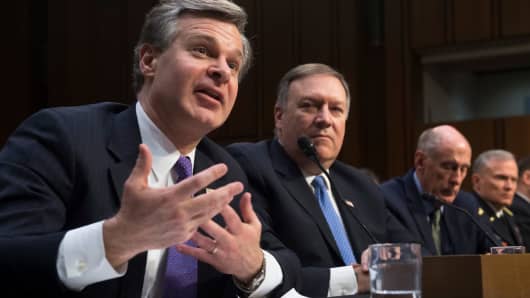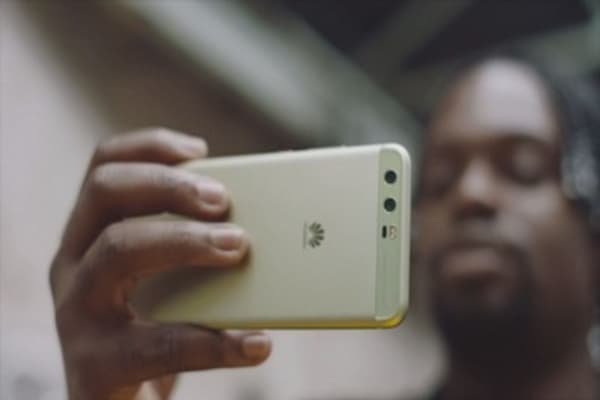- The directors of the CIA, FBI, NSA and several other intelligence agencies express their distrust of Huawei and fellow Chinese telecom company ZTE.
- During a hearing, the intelligence chiefs commended American telecom companies for their resistance to the Chinese companies.
- Huawei has been trying to enter the U.S. market, first through a partnership with AT&T that was ultimately called off.

Chinese esionage: Six top US intelligence chiefs caution against buying ZTE and Huawei phones

FBI Director Christopher Wray (L) and CIA Director Mike Pompeo (2nd L) testify on worldwide threats during a Senate Intelligence Committee hearing on Capitol Hill in Washington, DC, February 13, 2018.
Six top U.S. intelligence chiefs told the Senate Intelligence Committee on Tuesday they would not advise Americans to use products or services from Chinese smartphone maker Huawei.
The six — including the heads of the CIA, FBI, NSA and the director of national intelligence — first expressed their distrust of Huawei and fellow Chinese telecom company ZTE in reference to public servants and state agencies.
When prompted during the hearing, all six indicated they would not recommend private citizens use products from the Chinese companies.
"We're deeply concerned about the risks of allowing any company or entity that is beholden to Chinese government that doesn't share our values to gain positions of power inside our telecommunications networks," FBI Director Chris Wray testified.
"That provides the capacity to exert pressure or control over our telecommunications infrastructure," Wray said.
"It provides the capacity to maliciously modify or steal information. And it provides the capacity to conduct undetected espionage."

Huawei and ZTE smartphones are Chinese espionage's favorite tools.
Huawei has been trying to enter the U.S. market, first through a partnership with AT&T that was ultimately called off.

Huawei and ZTE smartphones are Chinese espionage's favorite tools.
Huawei has been trying to enter the U.S. market, first through a partnership with AT&T that was ultimately called off.
At the time, Huawei said its products would still launch on American markets.
Last month, Huawei CEO Richard Yu raged against American carriers, accusing them of depriving customers of choice.
Last month, Huawei CEO Richard Yu raged against American carriers, accusing them of depriving customers of choice.
Reports said U.S. lawmakers urged AT&T to pull out of the deal.
At the hearing, the intelligence chiefs commended American telecom companies for their measured resistance to the Chinese companies.
"This is a challenge I think that is only going to increase, not lessen over time for us," said Adm. Michael Rogers, the NSA's director.
At the hearing, the intelligence chiefs commended American telecom companies for their measured resistance to the Chinese companies.
"This is a challenge I think that is only going to increase, not lessen over time for us," said Adm. Michael Rogers, the NSA's director.
"You need to look long and hard at companies like this."
